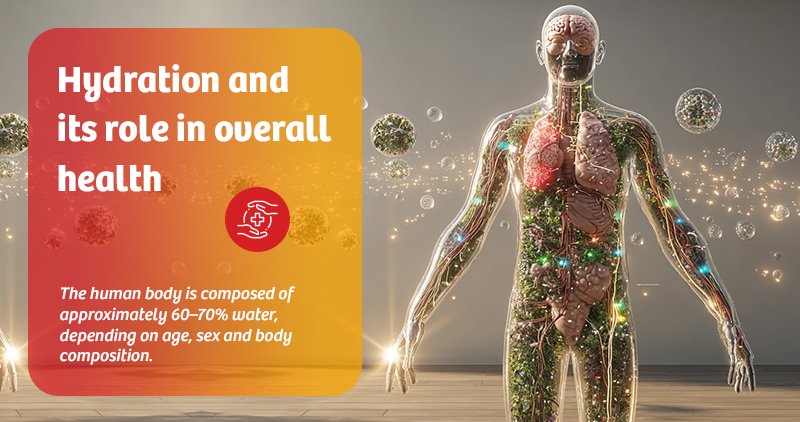

By Dr Archana Jadeja
Consultant Internal Medicine
Oct 13, 2025
Water is often called the “elixir of life,” and for good reason. Every cell, tissue and organ in the human body relies on water to function. From regulating body temperature to aiding digestion, from cushioning joints to maintaining healthy skin, hydration plays a crucial role in overall health and well-being.
Yet, despite it is important, many people underestimate their daily fluid needs or fail to recognise the signs of dehydration until it becomes a problem.
This blog delves into the science of hydration, its vital role in maintaining health, common myths, signs of dehydration, and practical strategies for staying adequately hydrated.
The human body is composed of approximately 60–70% water, depending on age, sex and body composition. Water is essential for
Even mild dehydration—losing as little as 2% of body weight in fluids—can negatively impact mood, energy levels, and cognitive performance.
1. Brain and mental function
The brain consists of approximately 75% water, and dehydration can directly impact mental clarity and concentration. Research shows that even slight dehydration can impair short-term memory, alertness and mood. Adequate hydration keeps the brain energised, reduces fatigue and enhances productivity.
2. Heart and circulation
Blood is roughly 90% water. When you’re dehydrated, blood volume decreases, forcing the heart to pump harder to deliver oxygen and nutrients. It can increase heart rate, lower blood pressure and in severe cases, contribute to fainting or cardiovascular strain.
3. Kidneys and detoxification
The kidneys filter waste products from the blood and maintain electrolyte balance. Proper hydration helps prevent kidney stones, urinary tract infections and chronic kidney disease. Insufficient water intake leads to more concentrated urine, increasing the risk of stone formation and infections.
4. Digestive health
Water is necessary for saliva production, nutrient absorption, and smooth bowel movements. Dehydration can cause constipation, indigestion, and acid reflux. Drinking adequate water supports gut motility and reduces bloating.
5. Skin and appearance
Hydrated skin looks plump, elastic, and radiant. Chronic dehydration contributes to dryness, premature wrinkles and dullness. While topical skincare matters, true skin health begins from within—with proper hydration.
6. Muscles and joints
Muscles require water to contract efficiently and joints need it for lubrication. Dehydrated muscles fatigue more quickly and are more prone to cramps, while insufficient fluid can make joints feel stiff or sore due to a lack of cushioning.
The popular “8 glasses a day” rule is oversimplified. Fluid requirements can vary based on age, activity level, climate, and overall health. According to the National Academies of Sciences, Engineering, and Medicine (NASEM)
These totals include fluids from beverages and foods, not just plain water. For example, cucumbers, watermelon, oranges, and spinach are water-rich foods that contribute to hydration.
1. Exercise and physical activity
During exercise, the body loses fluids through sweat. Athletes may need significantly more water and electrolytes to replace what’s lost. Sports drinks can be beneficial during prolonged, high-intensity activities, but for most people, plain water is sufficient.
2. Climate and environment
Hot, humid weather increases sweating, while cold environments may suppress thirst signals, leading to unnoticed dehydration. At high altitudes, rapid breathing and low humidity also lead to fluid loss.
3. Pregnancy and breastfeeding
Pregnant women need extra fluids to support fetal development and amniotic fluid. Lactating mothers require additional hydration for milk production.
4. Medical conditions
Causes
Early symptoms
Severe dehydration
If untreated, severe dehydration can lead to heatstroke, seizures, kidney damage, or even death.
1. Myth: Coffee and tea dehydrate you.
Fact: While caffeine is mildly diuretic, moderate consumption still contributes to hydration.
2. Myth: You only need water when you’re thirsty.
Fact: Thirst is a late sign of dehydration, especially in children and older adults.
3. Myth: Clear urine is always a sign of perfect hydration.
Fact: Clear urine can also mean overhydration, which dilutes essential electrolytes.
4. Myth: More water is always better.
Fact: Drinking too much water can lead to hyponatremia, a condition characterised by low sodium levels in the blood, which can be dangerous.
Balance is key.
Proper hydration is not just about avoiding thirst; it has long-term health implications
Hydration is one of the most cost-effective and most powerful steps you can take to support overall health. From sharper thinking and better energy to healthier skin, joints, and organs, the benefits of proper water intake are undeniable.
Since hydration needs differ for everyone, maintaining a routine of water, healthy drinks, and hydrating foods can improve overall well-being and help prevent many common health problems.
So, the next time you reach for a glass of water, remember: you’re not just quenching thirst, you’re fueling your body, protecting your organs, and investing in a healthier future.